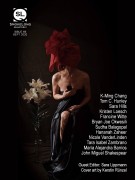“Thin Mints” makes powerful use of objects. The father “rebuilds” the mother out of possessions (purses and shoes), yet the story belongs to his daughter, who also focuses on her mother’s objects (purses and shoes). Tell us a bit about how you use specific, meaning-charged objects to build character.
Since I was going to have the mother “rebuilt” with her possessions, it was important to show at least one of these possessions in detail. I chose the purse. The purse is cobra skin with a gold buckle. I was hoping to show here that the mother had a certain fashion or status awareness. I wanted this one detail to let the reader draw in the rest of the mother’s physical appearance. The purse has been in the family for a long time and is almost an heirloom, in a way, as the narrator remembers it from when she was smaller. The narrator would have liked the purse to be passed on to her, but the father has gone from sleeping with the purse to giving it away to a stranger. He is unaware of the importance the purse holds for the narrator.
Another object I used to show character was the box of cookies. The Girl Scout offers the Thin Mints as a kind of thank you for the purse. The father seems ready to move on. He wants to move on. He is ready to give away the mountain of things that belonged to his wife and even abandon her cookie choice. However, the Girl Scout throws him a curve, and well ….
I am a big fan of echoes. How do you think (or do you think) a “universal” mother-daughter relationship echoes throughout “Thin Mints”?
Perhaps most kids think their mothers know everything and can solve everything. I know I did. So the narrator in this story also believed it. She saw the mother’s purse as magic. Then, later, after the mother has died, the narrator has that disappointing moment where she learns there was no magic. I had that moment of realizing that my mother was actually just a human. I think we all have that.
Another echo of the mother-daughter relationship is how we keep our mothers alive through their possessions and their traditions. They buy Samoas, even though the Girl Scout says no one buys them. (Certainly not really true, but story-true for my purpose.) They continue to buy the Samoas because the mother liked them.
I write many stories about mothers/daughters. It’s a subject that like my own mother, will sometimes just not leave me the hell alone. (Just kidding. I’d give anything to still have my mother.)
You are a prolific writer of poetry and flash fiction. I exclusively write fiction. Tell us about moving between genres. When you have an idea, how do know if it wants to be a poem or a piece of flash?
Poetry and flash are similar in their use of language and compression. For me, that’s where the similarity ends. Poetry is more meditative. It can have a narrative or not, but there is always a feeling of the speaker spinning thoughts around that is at the core of things. It always feels like the speaker is reflecting on something. I don’t get that feeling in a flash. In a flash I always feel like the story is unfolding in a way that is as much a surprise to the narrator as it is to the reader.
I usually have a pretty strong feeling about whether an idea is going to be a flash or a poem. I also know what genre I am going to work in when I sit down to write. I will very often just say, okay, I’m going to write a poem (or a flash) and take it from there.
You have a new flash collection coming out next year: The Cake, The Smoke, The Moon. Tell us a bit about the book.
This is a chapbook of twenty stories, each three hundred or fewer words. Some of the themes are my go-to obsessions of love-gone-wrong and family relationships. It’s part of the Magpies series from Emerge Literary Press. This series also contains other writers I so admire, such as Tommy Dean, Amy Barnes, and others. The titles will be rolled out separately into 2021. Mine is scheduled for release next September.
And perhaps most importantly: What is your favorite Girl Scout cookie?
Oh, Samoas. No question. And, by the way, the serving size is the entire box.



